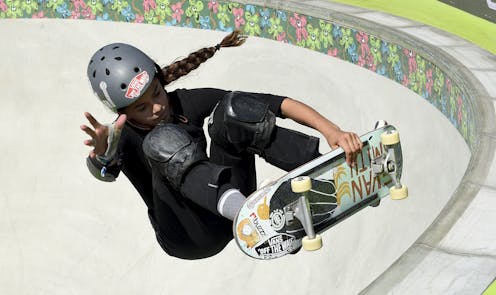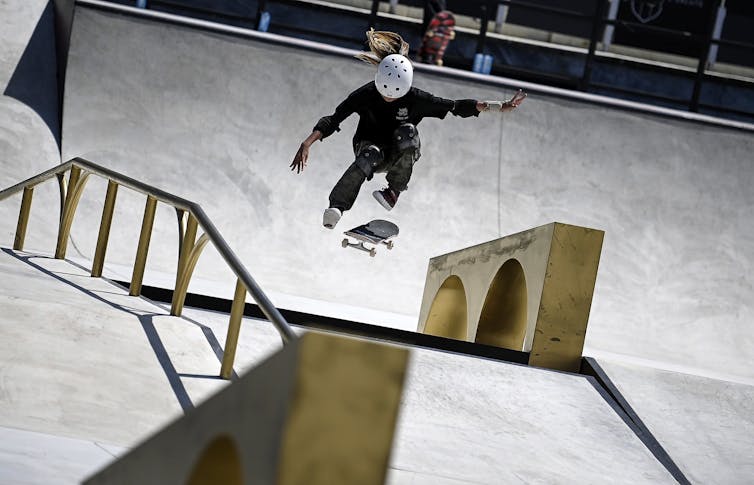Source: The Conversation (Au and NZ) – By Brigid McCarthy, Lecturer in Journalism, La Trobe University

Keith Birmingham/AP/AAP
Skateboarding will make its Olympic debut this year at the Tokyo Games.
The women’s and men’s competitions will both involve park and street events. In each, athletes perform optional skill sets within a time limit and are judged based on the combined difficulty and execution shown, similar to diving or gymnastics.
Skateboarding has been included at Tokyo for the first time as part of a bid to make the games “more youthful, more urban [and] include more women”.
But gender equality in sports is not as simple as just scheduling a women’s competition.
My research suggests female athletes in Tokyo are likely to cop sexist abuse online, especially if they are competing in traditionally male events.
Read more:
Alt goes mainstream: how surfing, skateboarding, BMX and sport climbing became Olympic events
My research
In my recently published research, I examined nearly 4,000 comments posted to YouTube about women’s skateboarding competitions. The comments were collected from 14 competition live streams, from 2017 to the end of 2019. The competitions selected were high-profile skateboarding events with large prizes.
Given that YouTube comments can be added, edited or removed at any time, all comments were extracted at the beginning of the study to create a stable data set.
‘Welcome to womanhoodsville’
Of the comments examined, 17% of those made on street skating competitions contained misogyny or abuse. While recent studies have found sportswomen to be individual targets of online abuse, I also found frequent gender discrimination targeting women skaters collectively. This was often expressed through gendered gate-keeping of both skateboarding and sport.
Girls, please stay in the kitchen.
Many comments used aggressive language that dehumanised and sexualised women.
Give the bitches armor [sic] so they don’t skate like pussies.
There were also frequent anti-feminist sentiments posted, suggesting women were being granted a free ride for the sake of equality.
Welcome to womanhoodsville, where you get 1000x the attention with a 1000th of the effort.
Interestingly — and disturbingly — some of the abusive comments we observed seemed to suggest women’s inclusion comes at the cost of men.
These hoe’s [sic] should be greatful [sic] that men did all the work so they can just go around doing flatground kickflips and missing 5050s for $20,000.
Dude culture
Despite women’s sustained participation, skateboarding has long been perceived as a “dude” culture. The new TV series Betty, based on its actors’ real-life experiences, highlights the macho monopolisation of skate spaces. As creator Crystal Moselle explains:
[…] skateboarding for so long has been set up as a male sport. So even just, like, going to the store to set up a board is intimidating. It’s a lot of intimidation.

Riccardo Antimiani /EPA/AAP
Women have also had to fight for competitive opportunities, including the sport’s “Billie Jean King moment”, when women threatened to boycott the 2005 X Games to gain better access to practice time, coverage and prize money.
Meanwhile, some major skate events have only recently included full women’s programs in the course of becoming Olympic qualifying competitions.
Beyond skateboarding
This is not just a skateboarding problem, unfortunately. There is a wider problem with misogyny in sport. The uninhibited online abuse we observed is similar to the explosion of sexist commentary that occurred around the formation of the women’s AFL league.
In 2019, trolls flocked to an image of AFL player Tayla Harris kicking a football. The following year, the Herald Sun attributed their decision to close comments on their coverage to “constant trolling, harassment and disgraceful commentary”.
And of course, sadly, it’s not just athletes — women working in sports journalism face this, too. This year, American sports writer Julie DiCaro published a book, Sidelined, about the online vitriol experienced by women working in the field.
Online abuse is everywhere
Since this research was undertaken, the vilest comments have been slowly removed from the streams. But this is not enough — online abuse of women is ubiquitous.
And while moderation can remove comments calling women skaters “a bunch of broken dishwashers” or a viewer’s bucket list of sexual acts they’d like an athlete to perform, it can’t change attitudes to women’s participation.
Abusive, sexist language posted on online spaces where the sport is now consumed by global audiences may also shape perceptions of skateboarding as neither inclusive nor safe for women. And this occurs at a moment when women skaters are poised to become more visible than ever, providing opportunity to inspire further growth at the grassroots level.
My research is yet another example of how social media can reveal the deep entrenchment of misogyny in a society where women are still seen as interlopers and threats to certain areas of public life.
![]()
Brigid McCarthy does not work for, consult, own shares in or receive funding from any company or organization that would benefit from this article, and has disclosed no relevant affiliations beyond their academic appointment.
– ref. ‘Girls please stay in the kitchen’ — as skateboarding debuts at the Olympics, beware of the lurking misogyny – https://theconversation.com/girls-please-stay-in-the-kitchen-as-skateboarding-debuts-at-the-olympics-beware-of-the-lurking-misogyny-161883



